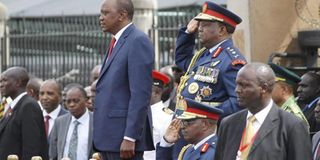Who is going to save Kenyans from these caterpillars?

President Uhuru Kenyatta outside Parliament before his State of the Nation speech on March 26, 2015. PHOTO | JEFF ANGOTE |
What you need to know:
- Where is the boundary between one people and another people?
- What is it that defines one people from another?
Both as a concept and in reality, political power has always meant a division of society between the people and their rulers. That a few individuals are rulers over a whole mass remains true whether you are a “democracy” or a totalitarian regime. The difference is claimed to lie only in the degree to which the mass participates in latching onto their rulers.
It is from the latitudinous width of that difference that arises the ideal which defines political freedom as self-rule by an ethnic or national people. That, it seems to me, is the meaning of “devolution”, a concept in vogue in our country once upon a time, but which has recently become increasingly controverted.
The problem is: Where is the boundary between one people and another people? What is it that defines one people from another? The question is not as simple as many people may think. For instance, if the British are one people, how do you describe the English, Irish, Manx, Scots and Welsh who compose the British?
Similarly, Kenya has merely started on the road to becoming one people. In the meantime, we remain a disparate conglomeration of many peoples called “tribes” – including Arab, Briton, Kalenjin, Kamba, Kikuyu, Kisii, Luhya, Luo, Maasai, Mhindi, Mijikenda and Somali.
TOTALITARIANISM
But, except in a so-called absolute totalitarianism, there is always, in a modern state, some transfer of power “downwards”. We, in Kenya, have recently experienced an example of it under the process known as “devolution”. To devolve is to pass certain responsibilities from one common centre to a number of downward, successive, substitutive or peripheral sub-centres.
Devolution may thus be defined as the systemic transfer of certain political powers from a single centre to a large number of separate subordinate centres.
Devolution, then, was what happened when London, an international power centre, transferred some of that power to smaller national centres, including Nairobi.
Devolution took place also when, more recently, Nairobi itself transferred some of the power devolved from London to each centre of 47 units called counties newly created by the Constitution. In general, then, both as a concept and in reality, devolution is the ideal of transferring self-government as far “down” as possible towards the “grassroots”.
Though I support the ideal, I must warn again that in the struggle to realise it, every ideal carries in its wake certain extreme perils. In Kenya, the chief problem is that devolution has merely been stated as an ideal. Nobody born on this side of British colonialism has ever experienced it. We happily rushed into the unknown without a single effort to study the many perils that might lie in its way.
DECENTRALISE
Biblical Jewry might have reminded us that, if you decentralise Sodom and Gomorrah by manning Israel’s 12 resulting units with the sons and daughters of the very archons of those god-forsaken Nairobis of yore – what you get is anything but new Edens.
Thus if Nairobi’s human products are what you can get as the leaders of your 47 devolved units – the question is ineluctable: Why do you do it? We now read in the newspapers exactly what we feared from the word go. It is that each of the 47 units has demanded – and is to get – billions from a taxpaying lot already overburdened by one of the world’s most oppressive tax regimes.
From our knowledge of the headquarters of each county, it is patent that none of the money will go into improving the people’s lives. Most of it will buy or build palatial homes for individuals, purchase sinuous new limousines, put up personal airports, enhance the equipment and capacities of dining rooms, suchlike.
Who will save Kenya’s impoverished masses from these caterpillars? The answer: Whoever initiates the process of returning Kenya to a single governmental system so that we can conserve the vital development resources available to us.





